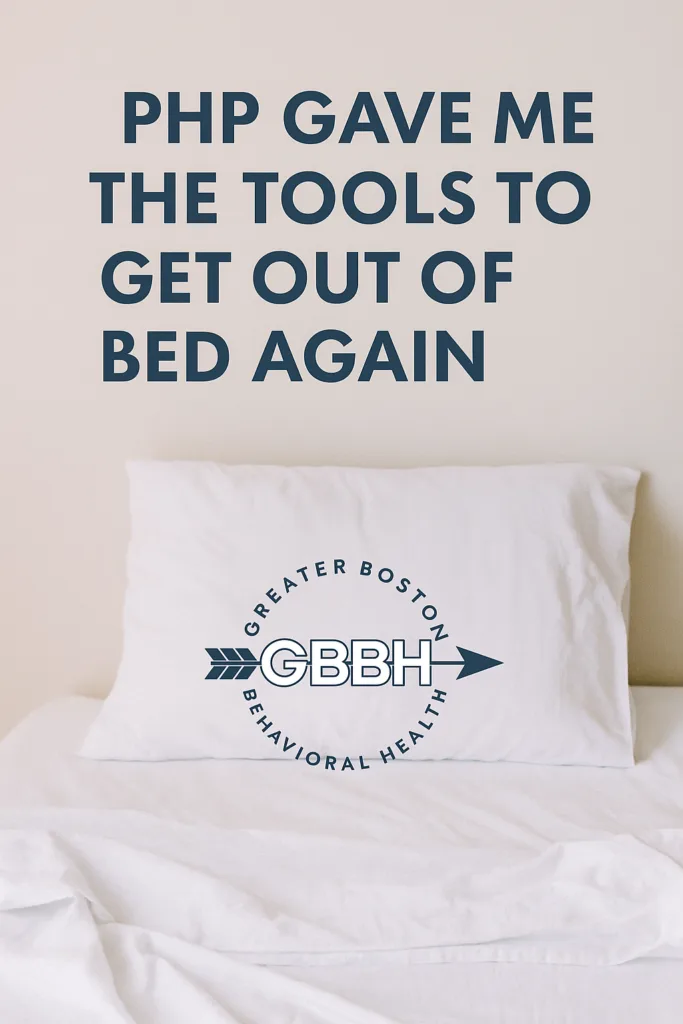There was a point where getting out of bed felt like climbing a mountain with no summit. I’d wake up, stare at the ceiling, and think, “What’s the point?” I wasn’t eating much. I wasn’t seeing friends. And I definitely wasn’t making it to work. Most days, I wasn’t even brushing my teeth.
I knew I was depressed. That part wasn’t a mystery. But knowing didn’t make it easier. I just felt stuck in it—like I’d been buried alive in slow motion. And the worst part? I honestly believed this was just how it was going to be now.
I Thought I Had to “Earn” Treatment
I didn’t think I was “sick enough” to get help. I hadn’t attempted suicide. I didn’t have a dramatic story. I was just sinking, quietly. But the people at Greater Boston Behavioral Health didn’t wait for me to hit some kind of rock bottom. They met me exactly where I was—tired, scared, numb—and they offered something I hadn’t felt in a long time: a next step.
That next step was their Partial Hospitalization Program (PHP).
What PHP Looked Like for Me
I was nervous about PHP at first. A full-day program? Five days a week? I barely had the energy to shower, let alone sit through therapy all day. But it turned out that the structure was the thing I needed most. My life had lost all shape. This gave it back.
Each day started with a group check-in. No pressure to perform—just a space to say how you were doing. Some days I said, “I’m here.” That was enough. Then we had group therapy, skill-building sessions, and time with a therapist one-on-one. We learned real tools: how to manage thoughts that spiral, how to cope when you’re numb, how to talk to people when you feel like disappearing.
Lunch was included, and honestly? That was big for me. I hadn’t been feeding myself regularly. Sitting with others, eating something warm, talking about music or movies instead of depression—those were the moments I started to feel human again.
The First Time I Laughed in Weeks
I remember this moment halfway through my second week. Someone in group cracked a joke. I laughed—not fake, not polite, but actually laughed. It startled me. I’d forgotten what it felt like. And in that moment, I realized something had shifted. I wasn’t just surviving anymore. I was starting to live again.
Why This Depression Treatment in Boston Felt Different
I’ve tried therapy before. I’ve taken meds. But this was different. PHP wasn’t just about crisis response. It was about rebuilding. About giving me tools for the in-between. I didn’t need to be hospitalized, but I also wasn’t okay. That grey area? That’s where PHP met me.
The staff didn’t expect me to be cheerful or motivated. They expected me to show up. And when I did, even on the hard days, they noticed. They cared. It made me care, too.
My Life Isn’t Perfect Now—But It’s Mine Again
I still have hard days. Depression doesn’t vanish. But I have tools now. I have a morning routine. I make it to work most days. I talk to friends. I brush my teeth. That might sound small, but if you’ve ever been where I was, you know it’s not.
If you’re reading this and you’re struggling, please hear this: you don’t have to wait until you break. You don’t have to hit bottom. If you’re hurting, you deserve help.
Greater Boston Behavioral Health gave me a place to start. And that changed everything.
FAQs About Depression Treatment and PHP
What is PHP (Partial Hospitalization Program)?
PHP is a structured mental health treatment program that runs during the day but allows you to return home at night. It includes therapy, group support, and skills training.
How is PHP different from inpatient treatment?
Inpatient means 24/7 care in a facility. PHP offers intensive care during the day, but you sleep at home. It’s ideal if you need more support than weekly therapy but don’t require hospitalization.
Do I need a diagnosis to enter PHP?
Not necessarily. If you’re struggling with symptoms of depression and daily functioning is hard, you might benefit. The team at Greater Boston Behavioral Health will help assess what level of care is right for you.
Will people know I’m in PHP?
Only if you tell them. It’s outpatient, so it’s more private than you might think. Many people balance PHP with flexible work or family needs.
How do I start depression treatment in Boston?
You can call Greater Boston Behavioral Health for an assessment. They’ll walk you through your options and help you figure out what fits your needs.
Ready to take the first step? Call Greater Boston Behavioral Health at (888) 301-8072. You don’t have to do this alone. We’re here when you’re ready.


